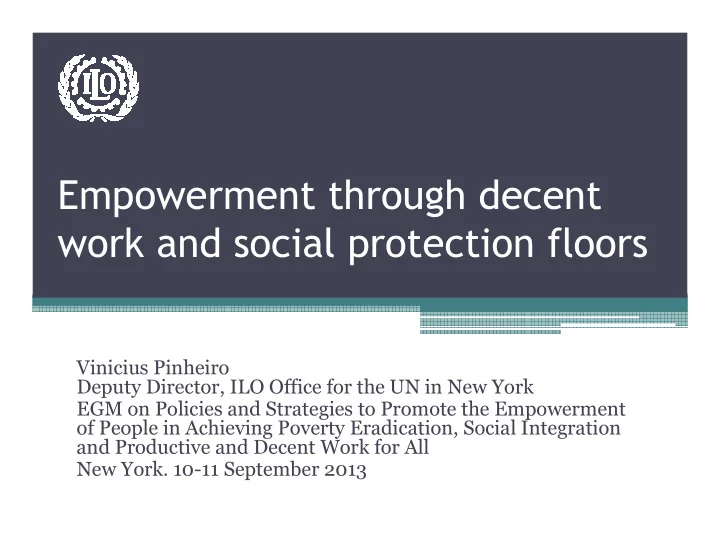

Empowerment through decent work and social protection floors Vinicius Pinheiro Deputy Director, ILO Office for the UN in New York EGM on Policies and Strategies to Promote the Empowerment of People in Achieving Poverty Eradication, Social Integration and Productive and Decent Work for All New York. 10-11 September 2013
There was a crisis before the crisis! • One in each three people is either unemployed or working poor • Four in each five people lack access to adequate social protection • Crisis toll: 67 million jobs gap • Lesson from previous crisis – employment recovery takes 5-7 yrs • Divergent employment picture ▫ Developed economies: increase in unemployment + Long term unemployment, discouraged workers and LF participation ▫ Developing economies: reduction in unemployment + concerns about informality and job quality
Youth unemployment: a generation at the risk… • Young people are three times more likely to be unemployed than adults • Some countries already crossed the 50% youth unemployment line • Scarred effects: Increase in the number of youth neither in employment nor in education or training (NEETs) • Post 2015 challenge: 470 million young people will join the labour force until 2030
Future prospects • Structural Challenges ▫ Job unfriendly growth (stagnant wages, declining in the labour income share, jobless growth) ▫ Demographics (youth bulge and labor force ageing) ▫ Technology, future labour market needs, skills mismatches • Possible consequences ▫ Social and political instability ▫ Undermine economic growth ▫ Deep and lasting effects on people’s skills and motivation
What should be done? 1. Empowering by putting employment at the heart of the macroeconomic policies 2. Empowering by investing in youth 3. Empowering by investing in social protection floors 4. Empowering by strengthening social dialogue and respect for labour standards
1 . Employment and social protection must at the heart of the macroeconomic policies…. • Minimum wage policies: Low wages can reduce labor costs and increase exports, but depress household consumption • Collective bargaining, which can better link productivity increases to wage increases and narrow wage dispersion • Financial and tax incentives for productive investment, and for small and microenterprises (SMEs) – the real job creator machine.
Policy Responses to the Crisis • Wage subsidies ▫ 24 countries in ILO/WB sample decreased social security contributions, 10 permanently ▫ Reduced contributions for SMEs (Colombia, France, Poland, Spain), young workers (Spain, Sweden), disabled workers (Spain), older workers (Italy, Spain) ▫ Hiring subsidies to firms hiring long-term jobseekers (UK) and young workers (Spain, Chile) • Work-sharing ▫ Reduce work volume over same number of workers to avoid layoffs, minimize firing/rehiring costs, preserve plants; often conditional on training ▫ Wage supplements from employer (Italy, Germany, France) or from unemployment insurance (Ireland, Spain, UK) • Public works programmes ▫ Infrastructure projects create jobs for low-income/unskilled workers ▫ Effective short-term safety net in low-/middle-income countries and produces public goods ▫ Implementation is successful if systems to deploy public works are already in place (Mexico, Kazakhstan, Turkey, Kenya, Botswana, South Africa, India)
Supply-Side Measures • Public employment service (PES) ▫ Prioritized in low- and middle-income countries; increasing in high-income countries since the crisis ▫ 5%-25% of unemployed use these services • Training interventions ▫ Prioritized in high-income countries ▫ Complement to public employment service • Focus on specific groups ▫ Majority of countries adopting PES and training measures target youth, some countries disadvantaged youth (US, France, Nigeria, Senegal) ▫ During the crisis 12% of countries in ILO/WB sample increased spending on integration /rehabilitation of disabled workers through targeted job creation (Peru, South Africa), special services (Japan), employment subsidies (Latvia) and special training (Estonia)
2. Call for action on youth employment - averting the risk of a lost generation • employment and economic policies to increase aggregate demand and improve access to finance; • education and training to ease the school-to-work transition; • labour market policies to target employment of disadvantaged youth; • entrepreneurship and self-employment to assist potential young entrepreneurs; and • labour rights: ensure that young people receive equal treatment and are afforded rights at work. • opportunities deriving from the transition to a greener economy
3. Social protection floors • ILO Recommendation 202 – Income transfers + social guarantees • Policy coherence approach to overcome fragmentation of social goals • Triple effect: Protect and empower people and contribute to boost the aggregate demand • ILO + IMF: It is feasible even in poor economies: not a matter of resources, but of political will
Social Protection Systems During the Crisis • Social assistance programmes/transfers ▫ Welfare and housing support for those not receiving unemployment benefits (US, France, Japan, Canada) ▫ Conditional Cash Transfers successful in reducing poverty pre-crisis (Latin America) but not a substitute for social insurance programmes ▫ Non-contributory pensions or health schemes expanded (Latin America) ▫ Cash or in-kind transfers (Africa, Asia) • Unemployment benefits ▫ Increased coverage in high- and middle-income countries ▫ Extended benefits in Latin America and Carribean • Healthcare ▫ Measures to protect the poor and unemployed from losing healthcare access • Pensions ▫ Increased benefits and/or coverage; lower contributions ▫ Structural reforms to improve efficiency (Argentina, Chile, Colombia, Malaysia, Nigeria)
4. Social Dialogue and Labour Standards During the Crisis ▫ Some countries regularized situation of undocumented workers to decrease their vulnerability (Brazil, Ireland) ▫ Measures taken on discrimination (Czech Republic), child labour (Botswana, Indonesia), trafficking (Bahrain, Thailand) ▫ Measures reflect long-term strategies rather than short-term responses to the crisis ▫ The extent of social dialogue determined by severity of crisis, strength of unions and tripartite legacy
Recommendations on promoting empowerment and opportunities • Implementing labour market policies as integral part of the macroeconomic policies • Promoting the skills for employment, in particular for the youth • Extend social protection floors • Strengthening social dialogue and respecting labour standards
•THANK YOU!
Recommend
More recommend